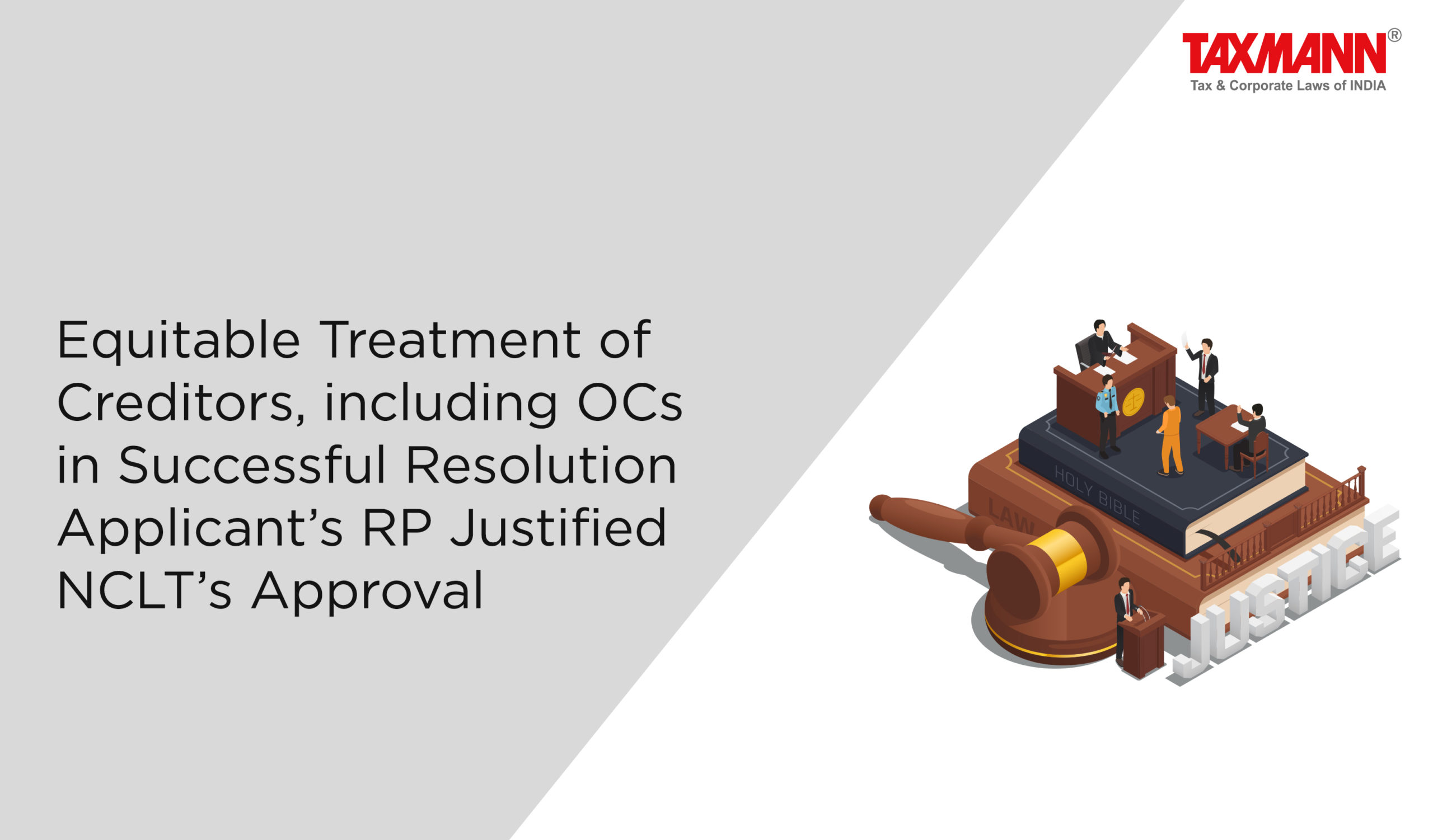Equitable Treatment of Creditors, including OCs in Successful Resolution Applicant’s RP Justified NCLT’s Approval
- Blog|News|Insolvency and Bankruptcy Code|
- 3 Min Read
- By Taxmann
- |
- Last Updated on 15 July, 2023

Case Details: SP Coal Resources (P.) Ltd. v. Indus FILA Ltd. - [2023] 152 taxmann.com 16 (NCLAT-Chennai)
Judiciary and Counsel Details
-
- M. Venugopal, Judicial Member & Naresh Salecha, Technical Member
- K. Goutham Shivshankar, Adv. for the Appellant.
- Ms Sahana Devanathan & Tushar Tyagi, Advs. for the Respondent.
Facts of the Case
In the instant case, the appellant had supplied imported coal to respondent no. 1 (i.e. corporate debtor) over several years and had raised invoices upon the corporate debtor. However, the same remained unpaid, and another operational creditor filed an application under section 9 of the IBC against the corporate debtor, which was admitted by the Adjudicating Authority (NCLT).
Later, the Resolution Professional (RP) made a public announcement inviting claims from creditors and the resolution plan of Respondent No. 2 (i.e. Successful Resolution Applicant-SRA) was approved by the Committee of Creditors (CoC) as well as the NCLT.
The appellant challenged the said approval, stating that there was no provision for any payment of debts owed by the corporate debtor to its operational creditors and that the resolution plan failed to meet two vital requirements i.e., Maximization of Value of Assets of the corporate debtor and Equitable and non-discriminatory treatment of operational creditors.
It was noted that SRA had offered Rs. 50.70 crores as a full and final settlement of all liabilities of the corporate debtor, which was duly approved with the requisite majority of CoC in its commercial wisdom.
Further, it was noted that the entire amount under the resolution plan was fully used in payment of the CIRP costs and dues of financial creditors and workmen and no amount remained to be allotted in respect of dues of other creditors. Therefore, the Liquidation Value payable to operational creditors was Nil.
NCLAT Held
The NCLAT observed that when the ingredient of section 30(2) was satisfied and there was equitable treatment between different classes of creditors and the same was between operational creditors as a class, the distribution was to be treated as fair and equitable.
The NCLAT held that since there was no aspect of discrimination between operational creditors, the resolution plan of SRA was rightly approved by the NCLT, which was free from legal flaws.
List of Cases Reviewed
-
- Order of NCLT (Beng.) in CP(IB) No. 136/BB/2017, dated 10-5-2019 (para 78) affirmed.
List of Cases Referred to
-
- Binani Industries Limited v. Bank of Baroda [2018] 99 taxmann.com 164/150 SCL 703 (NCLAT) (para 17)
- Swiss Ribbons (P.) Ltd. v. Union of India [2019] 101 taxmann.com 389/152 SCL 365 (SC) (para 18)
- Committee of Creditors of Essar Steel India Ltd. v. Satish Kumar Gupta [2019] 111 taxmann.com 234 (SC) (para 19)
- Central Bank of India v. Resolution Professional of Sirpur Paper Mills Ltd. [Comp. App. (AT) (INS) No. 526 of 2018, dated 12-9-2018 (para 30)
- Standard Chartered Bank v. Satish Kumar Gupta [2019] 105 taxmann.com 165/153 SCL 421 (NCLAT – New Delhi) (para 31)
- Transmission Corporation of Andhra Pradesh Ltd. v. Equipment Conductors and Cables Ltd. [2018] 98 taxmann.com 375/150 SCL 447 (SC) (para 35)
- Pratap Technocrafts (P.) Ltd. v. Monitoring Committee of Reliance Infratel Ltd. [2021] 129 taxmann.com 132/167 SCL 508 (SC) (para 36)
- Jaypee Kensington Boulevard Apartments Welfare Association v. NBCC (India) Ltd. [2021] 125 taxmann.com 360/165 SCL 678 (SC) (para 37)
- K. Sashidar v. Indian Overseas Bank [2019] 102 taxmann.com 139/152 SCL 213 (SC) (para 38)
- Kalparaj Dharamshi v. Kotak Investment Advisors Ltd. [2021] 125 taxmann.com 194/66 SCL 583 (SC) (para 39)
- Karad Urban Co-operative Bank Ltd. v. Swwapnil Bhingardevay [2020] 119 taxmann.com 46/161 SCL 457 (SC) (para 40)
- Damodar Valley Corporation v. Dimension Steel & Alloys (P.) Ltd. [2023] 147 taxmann.com 491 (NCLAT – New Delhi) (para 41)
- Maharashtra Seamless Ltd. v. Padmarabhen Venkatesh [2020] 113 taxmann.com 421/158 SCL 567 (SC) (para 50)
- Genius Security and Allied Services v. Shivadutt Bannanje [2022] 140 taxmann.com 542 (NCLAT – Chennai) (para 51)
- Rajputana Properties (P.) Ltd. v. Ultra Tech Cement Ltd. [2019] 108 taxmann.com 88/[2018] 144 CLA 490 (NCLAT – New Delhi) (para 56).
Disclaimer: The content/information published on the website is only for general information of the user and shall not be construed as legal advice. While the Taxmann has exercised reasonable efforts to ensure the veracity of information/content published, Taxmann shall be under no liability in any manner whatsoever for incorrect information, if any.

Taxmann Publications has a dedicated in-house Research & Editorial Team. This team consists of a team of Chartered Accountants, Company Secretaries, and Lawyers. This team works under the guidance and supervision of editor-in-chief Mr Rakesh Bhargava.
The Research and Editorial Team is responsible for developing reliable and accurate content for the readers. The team follows the six-sigma approach to achieve the benchmark of zero error in its publications and research platforms. The team ensures that the following publication guidelines are thoroughly followed while developing the content:
- The statutory material is obtained only from the authorized and reliable sources
- All the latest developments in the judicial and legislative fields are covered
- Prepare the analytical write-ups on current, controversial, and important issues to help the readers to understand the concept and its implications
- Every content published by Taxmann is complete, accurate and lucid
- All evidence-based statements are supported with proper reference to Section, Circular No., Notification No. or citations
- The golden rules of grammar, style and consistency are thoroughly followed
- Font and size that’s easy to read and remain consistent across all imprint and digital publications are applied



 CA | CS | CMA
CA | CS | CMA
